Adelson Dining Set
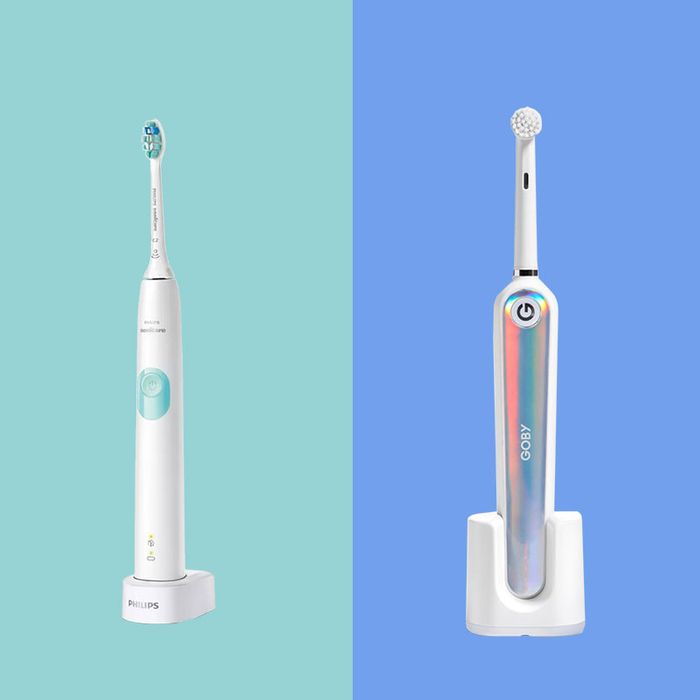
Photo-Illustration: retailers
Almost all the dentists we've talked to say electric toothbrushes are actually better for your overall oral health than manual brushes (there's just some places those OG bristles can't reach). And it's the classic dental-care brands — think Philips Sonicare and Oral-B — that often earn our experts' stamp of approval. The brushes have years of research behind them, and it shows.
That's not to say the shiny new toothbrush you bought from an Instagram ad won't clean your teeth. In fact, dentist Jonathan Levine points out that in one independent study, all types of powered toothbrushes outperformed manual ones in reducing plaque and gingivitis. "I'm a person who doesn't sit there in the mirror and completely focus on brushing my teeth; I tend to be distracted and do other things," says cosmetic dentist Amanda Lewis of Dallas-based Contemporary Family Dentistry. "The reason an electric toothbrush is great is that it continues to work while you're not thinking about it." Today's toothbrushes will even tell you what corners need cleaning and time you so that you hit the two-minute mark, she adds. Plus, dentist Marc Schlenoff, vice-president of clinical development at dental office Tend, tells us that electric toothbrushes help lessen the force put into cleaning teeth and gums, reducing the risk of gum recession and wearing away tooth structure.
Electric toothbrushes tend to fall into two camps: rotating and sonic. "A rotating brush oscillates in circles and pulsates to remove plaque, while a sonic one vibrates at a high speed," explains dentist Dan Di Cesare of Ironbound Dental Center. Some dentists said that one isn't necessarily better than the other, while others appreciate the power of sonic slightly more. The most important thing to remember is that any toothbrush you buy should feature the American Dental Association (ADA) Seal of Acceptance. "The seal of acceptance says that a product does what it says and says what it does and is safe and effective when used as directed," says dentist and ADA consumer adviser Matt Messina. After that, you shouldn't really stress — at least not when it comes to picking among dentist-approved electric options. Sonya Krasilnikov, a dentist and co-founder of Dental House, says, "Choosing between Sonicare and Oral-B is like picking between a Mercedes and BMW. It's mostly personal preference." Since the differences can be so subtle, we asked 21 dentists to break down their picks for the best electric models right now, below.
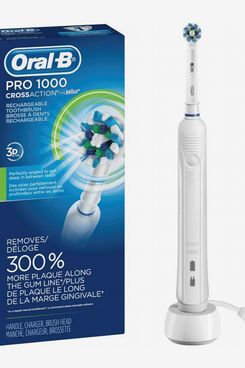
Identifiable by their small, round brush heads, Oral-B toothbrushes both rotate and vibrate (or oscillate). These brushes can rotate 44,000 times per minute — which Levine says causes "a lot of disruption of plaque" — and one study shows that rotating and oscillating toothbrushes have a small edge over comparable ones that simply oscillate. Orthodontist Janet Stoess-Allen, who is also a fan of this Oral-B brush, says that because teeth are curved, "rotating heads are more effective in getting to all sides of them."
This basic, rechargeable model offers the three main features dentists recommend: soft bristles, a pressure sensor, and a timer. "Hard-bristled toothbrushes are wonderful if you're going to clean the grout from your bathroom tile, but they're not for use in the mouth," says Messina, who explains that harder bristles can damage gums and enamel. Brushing too hard can do the same, which is why dentist Inna Chern likes brushes with pressure sensors that beep or stop moving when you're being too aggressive to "eliminate the possibility of overzealous brushing." Finally, the two-minute timer, which vibrates every 30 seconds when it's time to move to the next quadrant of your mouth, ensures you brush for enough time.
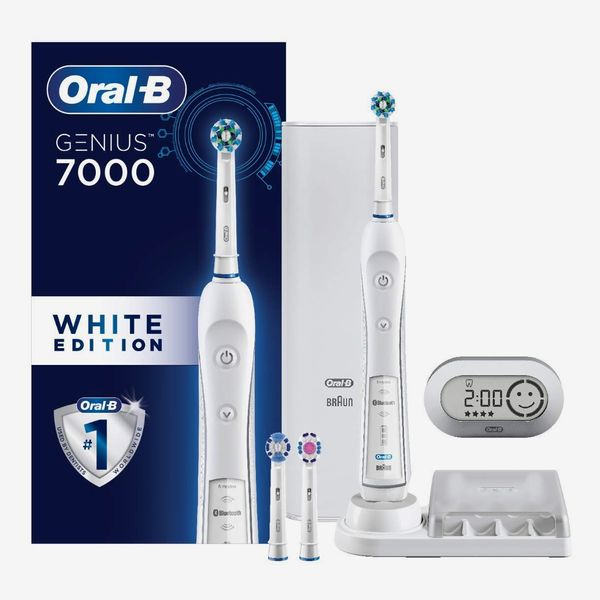
Cosmetic dentist Lana Rozenberg likes that Oral-B brushes generally "have more features" and are "more advanced than the others." Another cosmetic dentist, Leonard Umanoff of Brooklyn-based LuxDen, agrees, saying that he recommends all Oral-B electric toothbrushes that have a built-in timer, as this helps make sure you're brushing long enough to adequately get rid of plaque.
Oral-B's version of a tricked-out toothbrush, the 7000 Smart Series, has all the standard features plus six cleaning modes (including one for your tongue), a light-up pressure sensor, and even Bluetooth connectivity, so you can track your brushing habits on your phone. Dentist Hemita Klose of West Village Dental Studio recommends the 7000 model because of the external clock that lets you keep an eye on how long you've been brushing. "Two minutes is a lot of time," she says. "A lot of people don't realize that." Although she says the standard brushing mode is adequate for most people, she does like that the brush has a sensitive setting which she'll recommend to patients who've had gum grafts, are under periodontal care, or just have very tender gum tissue. And while you don't need an expensive electric toothbrush to get a good cleaning, Klose adds that the higher-end models tend to have a longer battery life, which is convenient if you're traveling and don't want to bring the charger along.
Because of their small brush heads, Chern says Oral-B brushes are a good pick "if your mouth is on the smaller side or you have gagging issues." A smaller brush head makes it easier for some people to reach their molars, too, she explains. If you have braces or other orthodontics, you also might prefer Oral-B, according to Stoess-Allen, who recommends the brand to her patients because it makes a brush head designed to navigate wires and bands in the mouth. Klose agrees that the small Oral-B brush head "gets around the corners a little better" and lets you access hard-to-clean areas like the back molars, which she says are "usually where most people will miss things."
[Editor's note: This toothbrush is back-ordered on Amazon.]
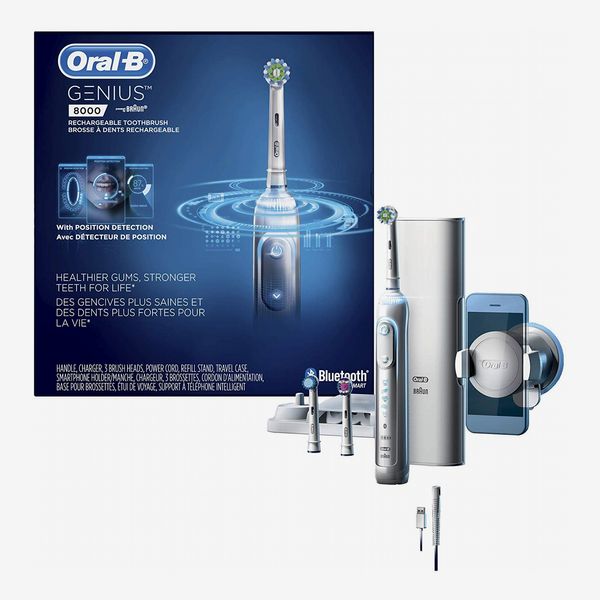
Like the dentists above, Pia Lieb, founder of Cosmetic Dentistry Center NYC, prefers Oral-B electric toothbrushes because they combine vibration and rotation to "remove particles that you can't even see with the naked eye." She likes that the Genius Pro 8000, one of the brand's most advanced models, features a pressure sensor that turns red if you're brushing too hard and comes with a phone holder so you can follow guidance on the app while you brush. "Having the app really does work because it makes you self-conscious of really brushing for two full minutes," says Lieb, who says that most people don't come close to the recommended time on their own.
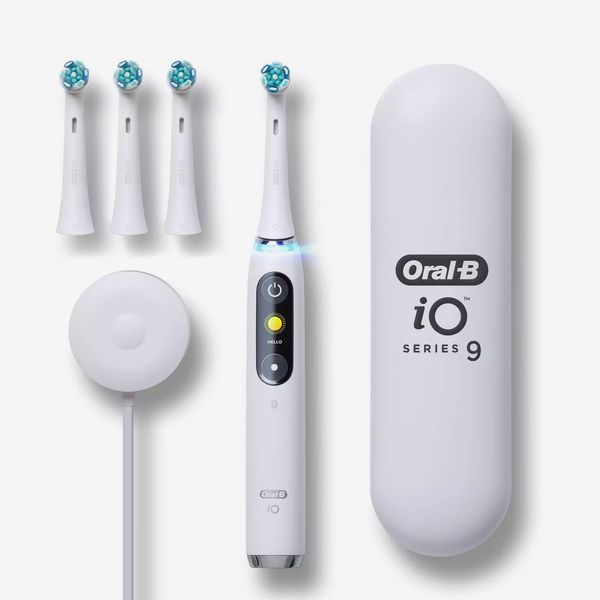
The latest addition to Oral-B's lineup comes recommended by two dentists, Di Cesare and Steven C. Cohen of Livingston Smiles, who says, "It leaves your mouth feeling as clean as the day you leave the dentist after your cleaning — every time you use it." Like the other Oral-B toothbrushes above, it has different smart modes (including one just for tongue-cleaning), expert-recommended small brush heads, a two-minute quadrant timer, and it can connect to an app so that you can see your brushing habits. Unlike those models, this toothbrush maps out each tooth's surface and features an interactive color display to coach you through a clean. These bells and whistles are a hit with Di Cesare's teen patients: "With this generation, anything that integrates with one's phone seems to hold their interest a bit better."
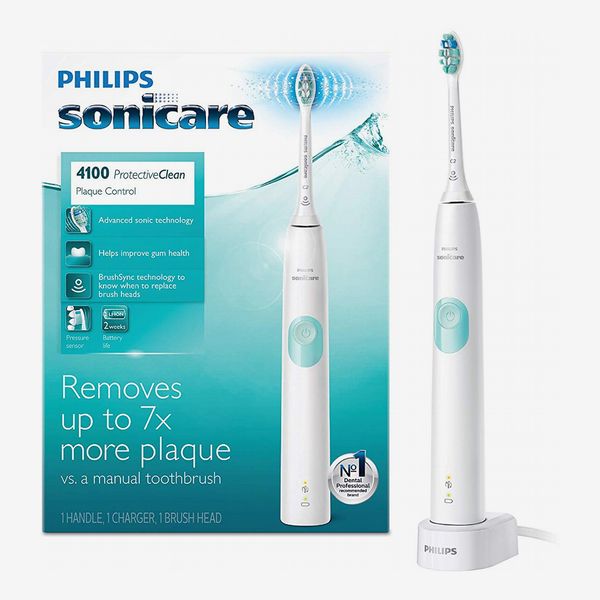
While they don't rotate, Sonicare toothbrushes are known for their large, flat brush heads and oscillating motion. Levine says they "use more of an ultrasonic vibrational energy to disrupt the plaque." Chern likes that "the sonic power helps to shake off plaque and tartar, aiding in the removal of these gingivitis-causing, bacteria-holding compounds." Even without a rotating head, this Sonicare brush will definitely give you a good cleaning. Krasilnikov says, "While the bristles only sweep back and forth, the brush sends out vibrations that are designed to break up particles and debris and allow toothpaste and fluids to access hard-to-reach places. Some patients love the feeling of the vibrations, but others think they're too ticklish." This model also features a timer, a pressure sensor, and dentist-recommended soft bristles.
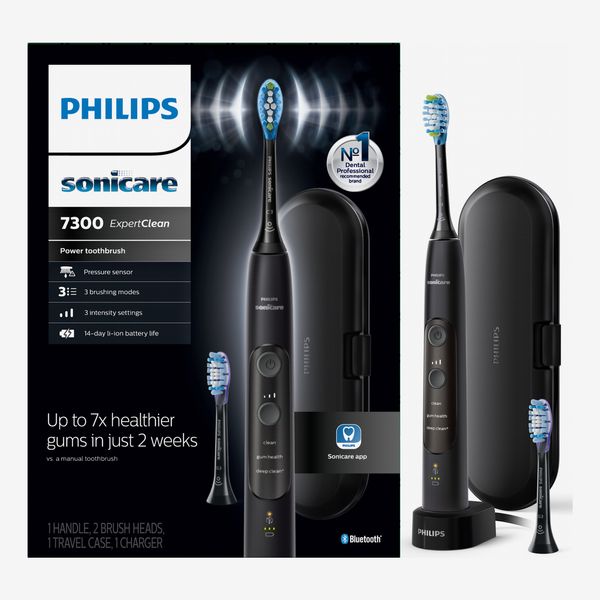
One of the newer members of the Sonicare family, this brush comes recommended by Chern and has three cleaning modes, including one for gum health, and an app that'll follow along with your brushing. "It has sensors that report back to the app, giving a progress report and feedback to improve patients' hygiene," says Chern. "Like a mini-hygienist in a brush." The 14-day battery life is great for travel, and the brush also has an indicator that'll display when it's time to change your brush head.
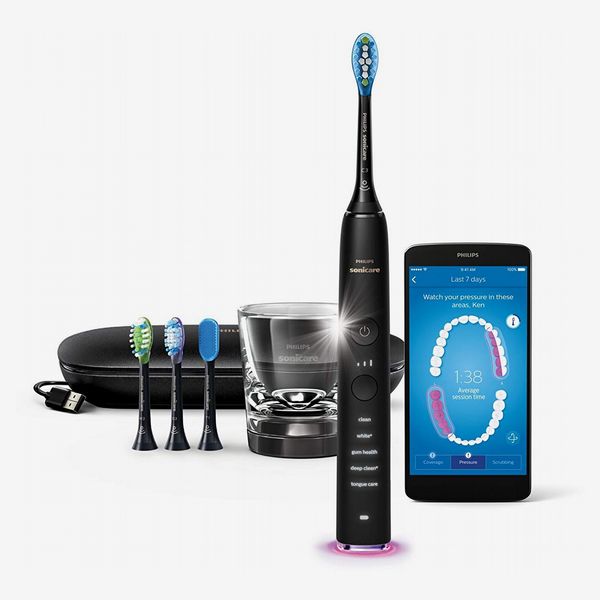
If you know you like the feel of a Sonicare, this high-end version offers the same deep clean with more bells and whistles, like five different brushing modes, including "sensitive" and "gum care." Plus it's a longtime Strategist favorite: Senior editor Simone Kitchens says, "It's the closest approximation to that thorough, just-back-from-the-dentist squeaky clean," and writer Stephen Haskell says, "brushing feels like a mouth massage, gentle while still providing adequate pressure." According to dentists, you're not necessarily getting a better cleaning experience with a more expensive brush, but Chern says pricier models offer more "creature comforts," like the little glass the DiamondClean sits in to charge.
Plus, at higher price points, "the internal mechanicals are better made and will hold up over time," adds Messina. Cosmetic dentist Stephanie Dumanian of Park Lex 60 Dental calls it "the Ferrari of electric toothbrushes," and Siama Muhammad of Brooklyn Oak Dental Care loves how powerfully its ultrasonic vibrations remove plaque. Dentist Ben Elchami, a co-founder of Dntl Bar, says he's seen his patients' oral hygiene improve after using both Oral-B and Sonicare toothbrushes. Personally, he is a Sonicare fan and uses the DiamondClean at home. "I like it because it forces me to brush the full two minutes," he says. "It also flashes and vibrates when I press too hard, which is something that I subconsciously do. In that sense, it helps me improve my technique to preserve my gums and teeth."
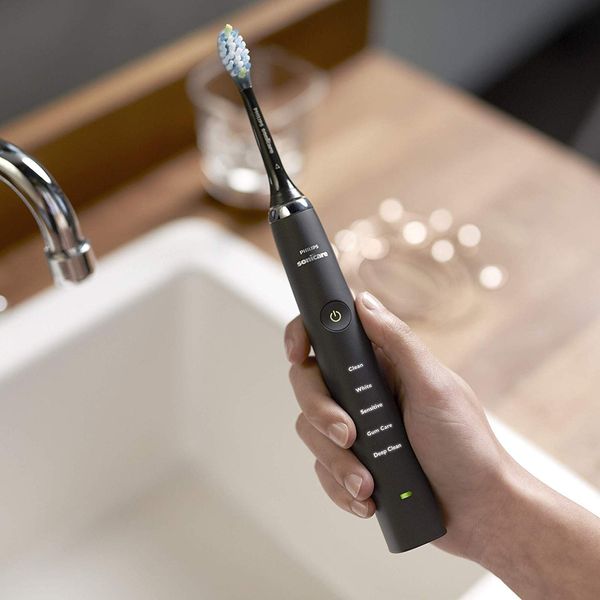
Orthodontist Heather Kunen, co-founder of Manhattan's Beam Street dental office, tells us she "swears by" this midrange Sonicare. It's got five brushing modes and a two-minute timer like the DiamondClean Smart but no app or pressure sensor. "The toothbrush bristles are soft," she says, "and the brush comes with a variety of features that are useful for optimal cleaning." While Kunen agrees with other dentists that small, round brush heads allow for a more thorough cleaning, she says any toothbrush's efficacy depends on user technique, and brushers who are less meticulous about moving a small brush around every corner of each tooth will benefit from the Sonicare's broader head.
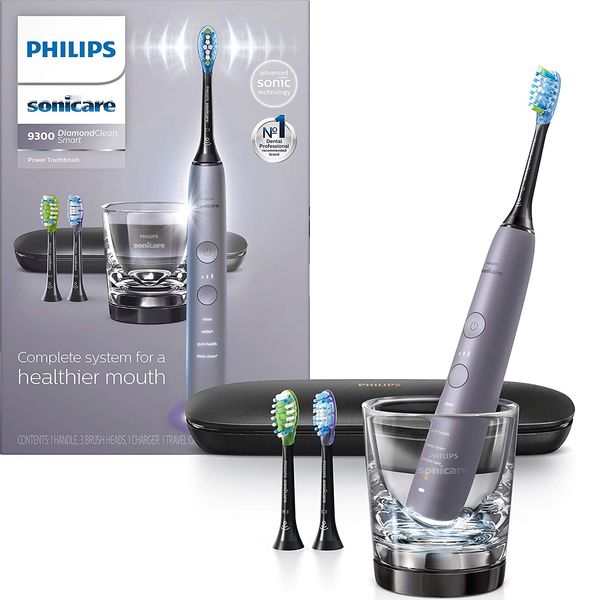
Philips Sonicare's DiamondClean 9300 model is dentist Mahvish Ahmed of Smile Design Manhattan's personal favorite and the one she recommends to patients the most by far. According to Ahmed, it's particularly user-friendly because of its easy-to-store glass holder that doubles as a charging station, its included travel case, and its real-time app feedback on how you're brushing. And the brush's bristles are longer, meanwhile the brush's head is shorter, allowing you to deep-clean the back of your mouth and making for a "squeaky clean and refreshed" feeling after brushing, she adds.

Dentist Sharon Huang of Les Belles NYC in Manhattan approves of this brush for those transitioning from manual brushes to electric ones as the pressure sensor can help "overzealous brushers." She also points out that the smart toothbrush allows you to set goals, track progress, and get tips on brushing patterns for a better clean.
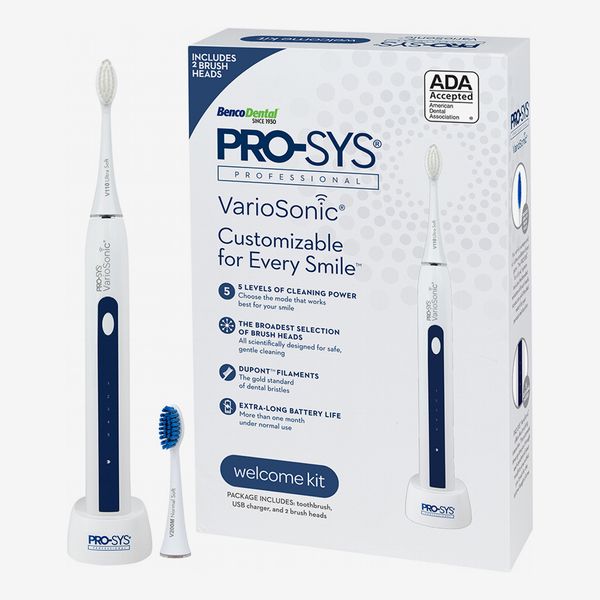
It doesn't have the name recognition of some of the bigger brands, but the Pro-Sys sonic brush is marketed to dentists and many sell it directly to patients in their offices, Levine says. "It's a very good brush and half the price of the expensive ones," he says. "It has very, very soft bristles and a very nice ovaline head, so it does a good job of getting way back into the mouth." Dentist Yuliya Rabinovich of Dental Muse family dental practice points out the adjustable settings on this brush, which comes with five brush heads, each with five brushing speeds.
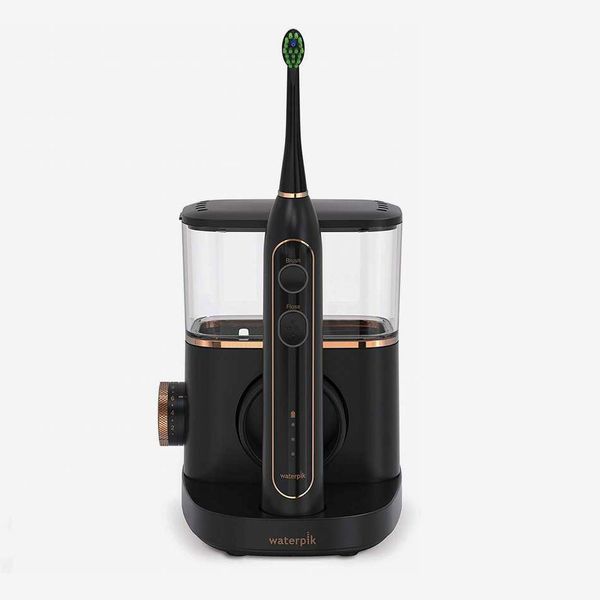
If you're shopping for an electric toothbrush and a water flosser, consider this two-in-one model that combines the best of both devices. Compared to regular flossing, water flossing is "less technique-sensitive" according to dentist Jill Lasky, and helps really get into the narrow spaces in between your teeth. Dentist Cindy Roark, the chief clinical officer at Sage Dental, agrees, adding that any of Waterpik's flosser products can work well for those who aren't prolific flossers. Dentist Elisa Mello of NYC Smile Design says she uses this water-flosser-sonic-toothbrush combo to get the benefits of both simultaneously. Rabinovich recently started recommending this flossing toothbrush to patients: "Although I don't think any toothbrush or water flosser can replace the important function of a string passing between teeth, I feel that [this] is the next best thing." She describes how after using it, her mouth feels like "I just had my hygienist go at it." And as some might find Waterpiks messy, Lewis recommends the cordless kind to floss in the shower.
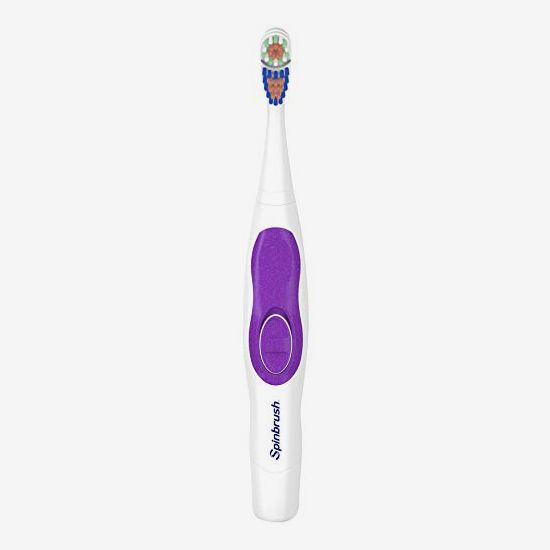
If you want to try out an electric toothbrush without dropping a lot of cash — or want one to travel with that you won't mind losing — this is one of the few ADA-approved models you'll find in the drugstore. It has no timer or pressure sensor, but Levine says it's "a good starting point, good for travel, and better than manual." This brush oscillates and rotates, so you can get a feel for both styles. If, after trying it, you find you love the electric feel, it might be worth it in the long run to buy a higher-quality model. Even though you can replace the Arm & Hammer's brush heads and batteries, it and other low-cost brushes tend to be "disposable in the sense that you've got plastic mechanical parts … and those will wear out," Messina says.
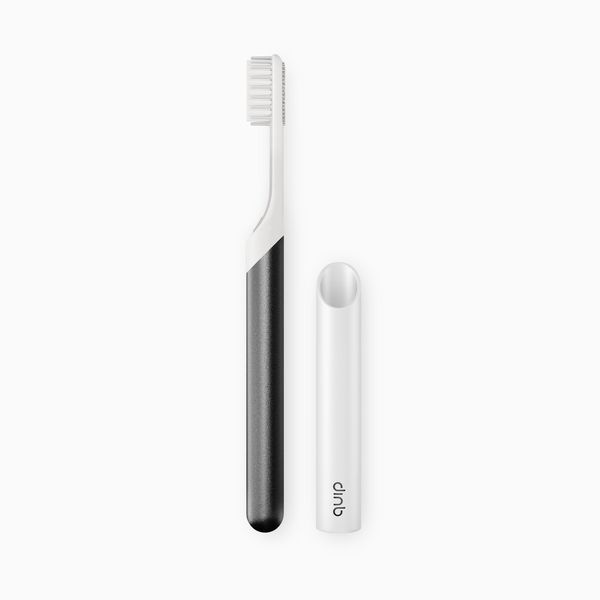
Although Quip was the first direct-to-consumer toothbrush to earn ADA acceptance, the sleek, heavily marketed brush is by far the most debated among dentists. Levine acknowledges that the very millennial-friendly brush has "raised awareness of the importance of oral health," especially among young people, but says there has been no testing that demonstrates "disruption of plaque, plaque control, [or] improvement of any type of gingival inflammation." Still, Chern calls it "a great brush to test the waters with," and she loves Quip's brush-head-refill subscription program. Stoess-Allen, who hasn't used one herself, says as long as it has the ADA seal and soft bristles, this brush should be effective.

Another start-up to make it onto dentists' radar, Goby makes brushes that are both effective and well-designed. The brand's brush also recently became ADA-approved. Dumanian says the colors of the Goby brush are "like eye candy for your bathroom counter." It's not just nice to look at though: "The oscillating head provides a deeper clean than most entry level toothbrushes," she says. "And the subscription service takes the guesswork out of when to change the toothbrush head out so you don't have to worry about overgrowth of bacteria."
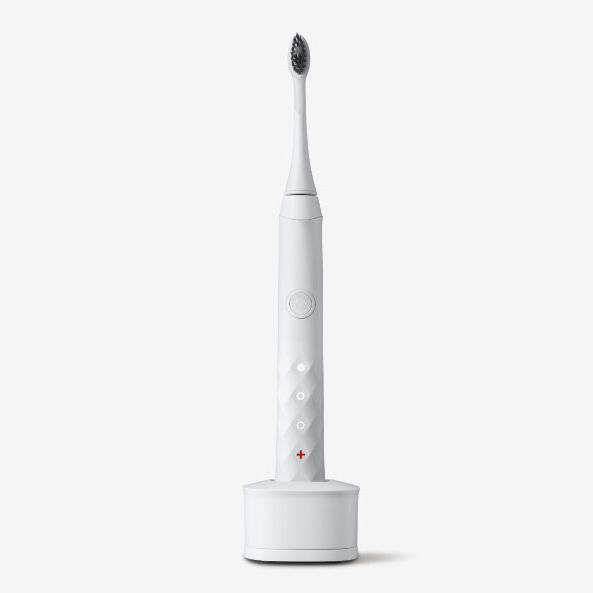
It's important to note that Burst's toothbrush isn't ADA-approved. It features charcoal bristles, but there isn't enough literature out there to support the effectiveness of charcoal in oral-care products, according to Huang. But it's her favorite electric toothbrush on the market right now, which she also mentioned to us in our guide to bad-breath remedies. The combination of short and long bristles on the brush makes for an especially efficient clean — as the former removes surface plaque, and the latter removes bacteria in hidden, hard-to-reach areas like behind molars, Huang explains. As someone with sensitive teeth and gums, she describes it as gentle because of its fine and soft bristles.It operates at 33,000 vibrations a minute with longer battery life (one month on one charge) than some other models she has seen. Former Strategist writer Hilary Reid tried it out, along with other start-up brushes, and found that while it was ticklish, it did make her teeth look a little whiter.
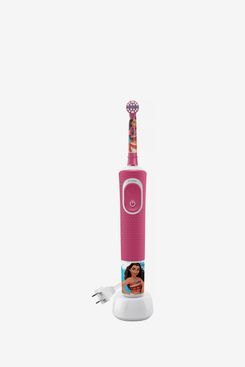
Generally, you'll want to wait to introduce kids to electric toothbrushes since toddlers' gums may be too tender for bristles, Rabinovich tells us. Usually, kids' electric toothbrushes are marketed for ages 3 and up, but Rabinovich recommends them for those older than 5.
Cohen, Di Cesare, and Rabinovich all advise going with a brush with their favorite character or cartoons. "Are they in a Disney Princess or PAW Patrol stage? Kids are more likely to use a toothbrush with their favorite characters on it," Rabinovich says. Both Cohen and Di Cesare approve of Oral-B's collection of kids' brushes owing to their built-in timers and gentle bristles.
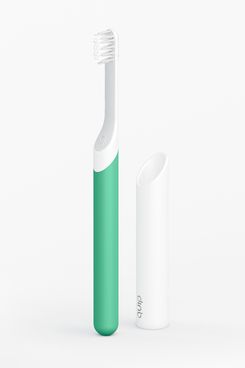
Rabinovich's kids use this toothbrush, which "does offer some ultrasonic vibration, [but] it's not overwhelming" for teeth that are still growing. The soft bristles are surrounded by rubber massagers, which are gentler on tender gums with loose and erupting teeth, she adds. It comes in four bright colors: blue, pink, purple, and green. "And the subscription service for replacement heads and batteries means one less thing for me to remember to do as a parent," Rabinovich explains.
The Strategist is designed to surface the most useful, expert recommendations for things to buy across the vast e-commerce landscape. Some of our latest conquests include the best acne treatments , rolling luggage , pillows for side sleepers , natural anxiety remedies , and bath towels . We update links when possible, but note that deals can expire and all prices are subject to change.
Source: https://nymag.com/strategist/article/best-electric-toothbrushes-dentists.html

0 komentar:
Posting Komentar